Bibliothèque
Toutes les ressources
2081 – 2100 sur 2626 résultats

Testing Branchless Banking to Deliver Cash Transfers in Nepal
Policy paper
The Human Development Social Protection Pilot (HDSPP) is a sub-project of the joint UNDP-UNCDF Local Governance and Community Development Program (LGCDP). It has been initiated in two far-western districts in Nepal, Kanchanpur and Dhadheldura and it is being implemented by the Ministry of Federal Affairs...
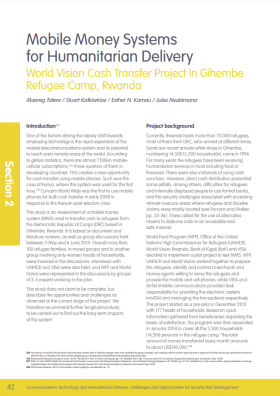
Mobile Money Systems for Humanitarian Delivery: World Vision cash transfer project in Gihembe refugee camp, Rwanda
Report
One of the factors driving the steady shift towards employing technology is the rapid expansion of the mobile telecommunications system and its potential to reach even remote areas of the world. According to global statistics, there are almost 7 billion mobilecellular subscriptions, three-quarters of them...

Financing of Cash Transfer Programming
Policy paper
This thematic report has been undertaken as part of a 2013 research study entitled, Is Cash Transfer Programming ‘Fit for the Future’? The research was commissioned by the the CALP Network and undertaken by the Humanitarian Futures Programme (HFP), King’s College London. The overall...

Does one size fit all? The Conditions for Conditionality in Cash Transfers
Presentation
Created in the early 1990s in Latin America, Conditional Cash Transfer programmes (CCTs) are now at the forefront of the international policy debate as one of the most effective social interventions for tackling poverty in developing countries. However, if CCTs have been successful in achieving some of...
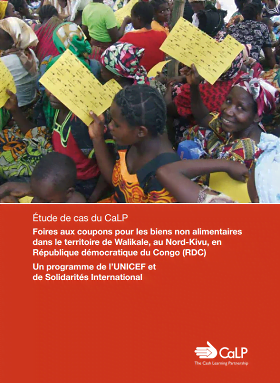
Étude de cas du CALP Network – Foires aux coupons pour les biens non alimentaires dans le territoire de Walikale, au Nord-Kivu, en République démocratique du Congo (RDC)
Case Study
Afin de répondre à une situation d’urgence soudaine, l’UNICEF et Solidarités International ont eu recours à une approche monétaire par le biais de coupons dans les villages de Nyasi et Bobolo, dans le territoire de Walikale, au Nord-Kivu, en République démocratique du Congo (RDC). Dans le...
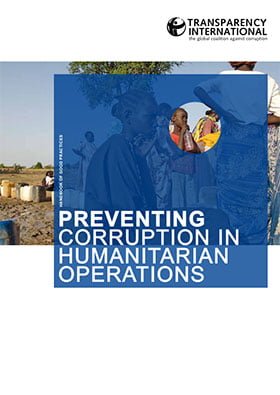
Preventing Corruption in Humanitarian operations
Guidelines and Tools
Transparency International (TI) has long held that the most damaging impact of corruption is the diversion of basic resources from poor people. Corruption in humanitarian aid is the most egregious form of this, as it deprives the most vulnerable poor people, the victims of natural disasters and civil...
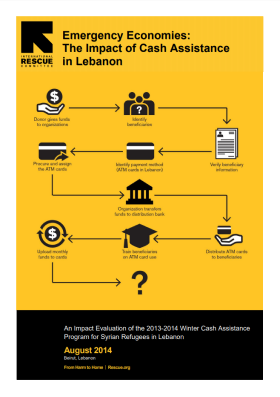
Emergency Economies: The impact of cash assistance in Lebanon
Report
An impact evaluation of the 2013-2014 winter cash assistance program for Syrian refugees in Lebanon. This report describes the impacts of the winter cash transfer program run by UNHCR and partners from November 2013 to April 2014. The program gave $575 USD via ATM cards to 87,700 registered Syrian...

Insufficient Evidence? The Quality and Use of Evidence in Humanitarian Action
Report
This paper (and the ALNAP meeting on which it is based) is underpinned by the sense that ‘at present, humanitarian decisions are often based on poor information’ (DFID, 2012: 5) and are ‘anecdote, rather than evidence, driven’ (Mazurana et al., 2011: 1). Even when evidence is available, decisions...
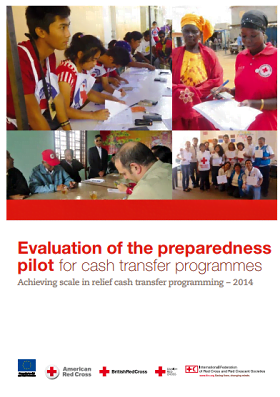
Evaluation of the Preparedness Pilot for Cash Transfer Programmes – Achieving scale in relief cash transfer programming – 2014
Report
It is recognized that cash transfer programming can be effective in supporting populations affected by disasters in a way that maintains dignity and choice for beneficiaries while stimulating local livelihoods, economies and markets. However, the majority of cash transfer programming has been undertaken...
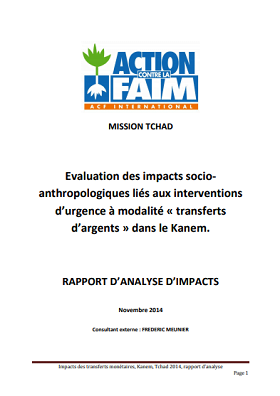
Évaluation des impacts socio-anthropologiques liés aux interventions d’urgence à modalité « transferts d’argents » dans le Kanem – Rapport d’analyse d’impact
Rapport
Ce rapport reflète les constats perçus par l’évaluateur externe sur les impacts des actions de transferts monétaires sans contrepartie dans la région du Kanem et dans le cadre existant des projets en 2014. Les mesures de mitigations des impacts négatifs sont formulées dans le cadre de la...
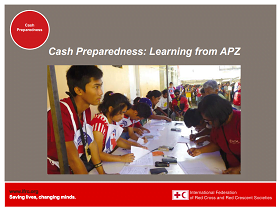
Cash Preparedness: Learning from APZ
Report
Cash Preparedness: Learning from APZ
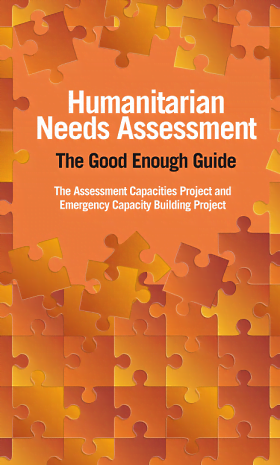
Humanitarian Needs Assessment – The Good Enough Guide
Report
Needs assessment is essential for programme planning, monitoring and evaluation, and accountability, however needs assessment is still a critical weakness of humanitarian response. Organizations urgently need to improve how they do assessments. The humanitarian community has been working on this issue...

Leveling the Playing Field: How do we make social protection more transformative?
Policy paper
Today social protection has a central place in development agenda. It is no longer seen just as protection for the poor but also as a way to promote growth by transforming the poor into a productive force to boost national economies. Nepal adopted this idea earlier than many other countries in the region....
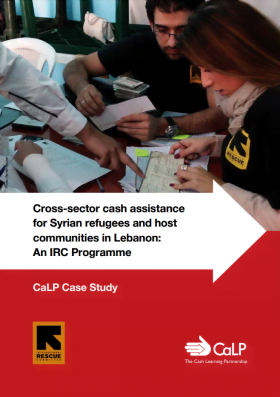
Cross-Sector Cash Assistance for Syrian Refugees and Host Communities in Lebanon: An IRC Programme
Report
Since January 2013, the International Rescue Committee (IRC) has been implementing a project providing humanitarian assistance to the Syrian refugees in Lebanon. This project provided unconditional financial assistance to targeted Syrian refugees and Lebanese host households to help them be better...

Étude de cas du CALP Network – Subventions monetaires sans conditions pour l’aide humanitaire et le relevement dans les provinces de Rizal et de laguna aux Philippines (suite au typhon Ketsana)
Rapport
Afin de répondre aux inondations soudaines survenues dans les provinces de Laguna et de Rizal aux Philippines, Oxfam International a mis en oeuvre un programme de transfert monétaire en trois phases : des transferts monétaires sans conditions pour la population afin de répondre aux besoins...
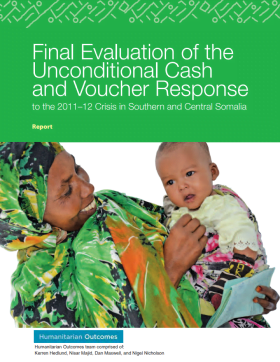
Final Evaluation of the Unconditional Cash and Voucher Response to the 2011–12 Crisis in Southern and Central Somalia
Report
This report sets out to determine the effectiveness of the unconditional cash and voucher interventions in southern and central Somalia. This evaluation however cannot be limited to the interventions at hand. It necessarily considers the broader context that led to the failure of the humanitarian...

Communications Technology and Humanitarian Delivery – Challenges and Opportunities for Security Risk Management
Report
The articles contained in this publication are dispatches from a new frontline in humanitarian action: the digital frontier. All are written by those observing, experiencing and attempting to respond to the challenges created by the digital revolution and the very real threats it is creating for...

Refugee Economies: Rethinking popular assumptions
Report
‘Refugee economies’ remain under-researched and poorly understood and there is a lack of good data available on the economic lives of displaced populations. Existing economic work on refugees tends to focus narrowly on refugee livelihoods or on the impact on host states. Yet, understanding these...

Evaluation des impacts socio-anthropologiques liés aux interventions d’urgence à modalité « transferts d’argents » dans le Kanem – Rapport d’orientations stratégiques
Rapport
Ce rapport donne des orientations stratégiques et programmatiques ainsi que des recommandations sur les évolutions des programmes de transferts monétaires non conditionnées dans la région du Kanem. Il se base sur une analyse des ressources locales, des liens externes à la région, des positions des...
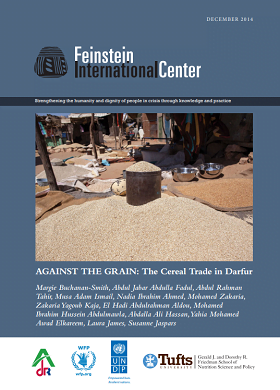
Against the Grain: The Cereal Trade in Darfur
Report
WFP began to pilot food vouchers in Darfur in 2010 as an alternative to general food distribution. The main purpose of the voucher program is greater cost-efficiency for WFP, increased choice for beneficiaries, and strengthening of markets. It is also expected to create market multiplier effects and...